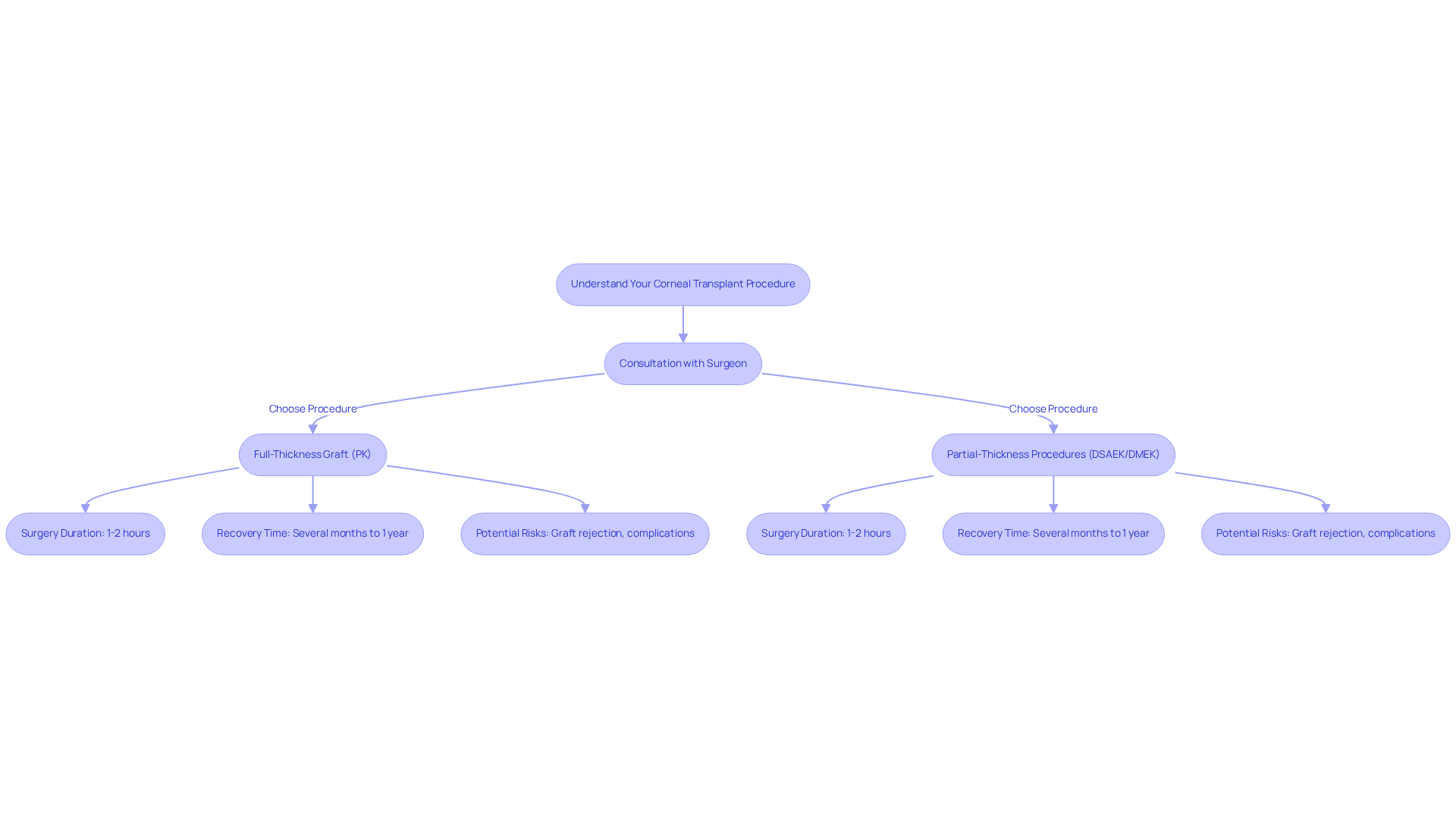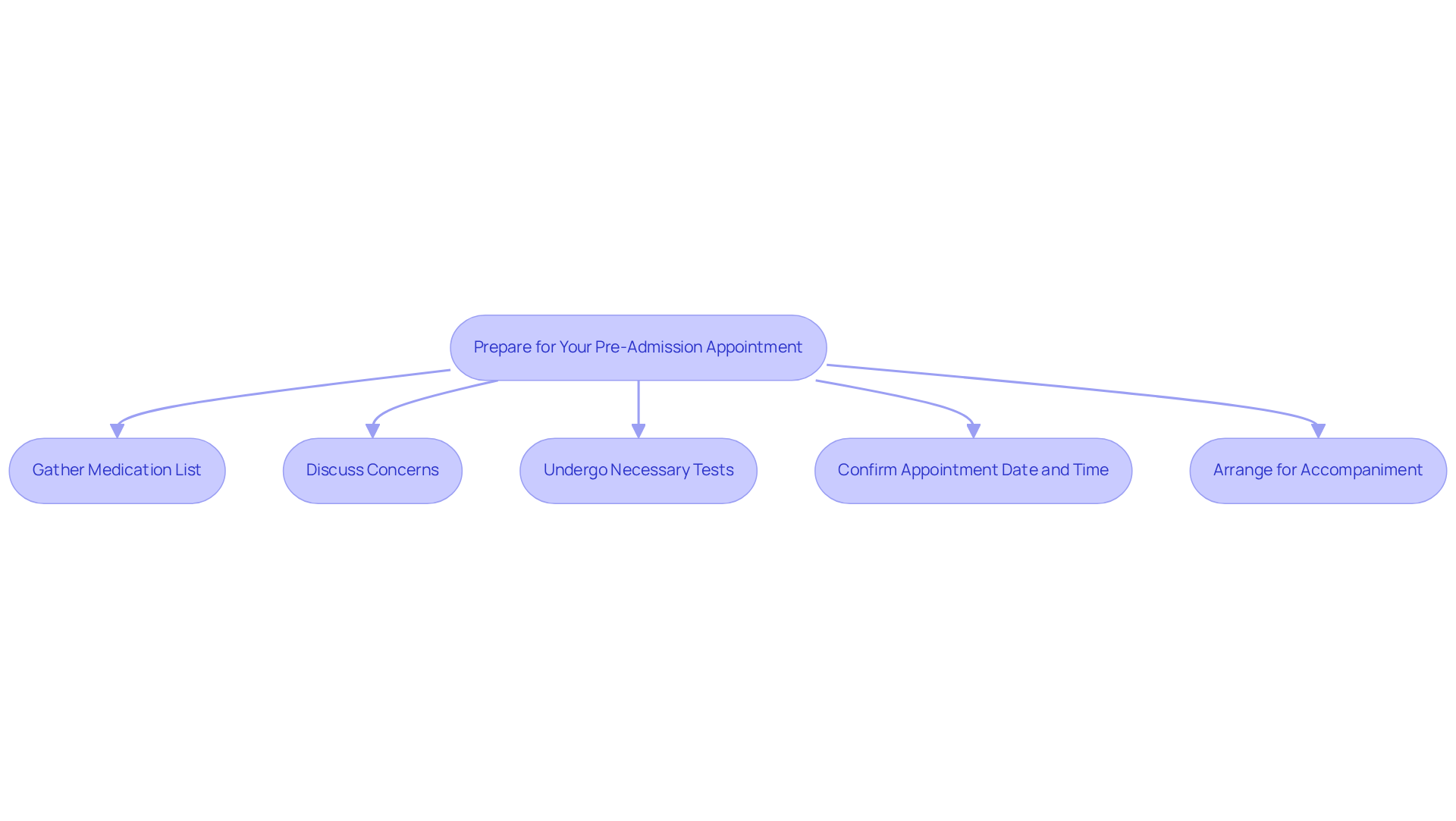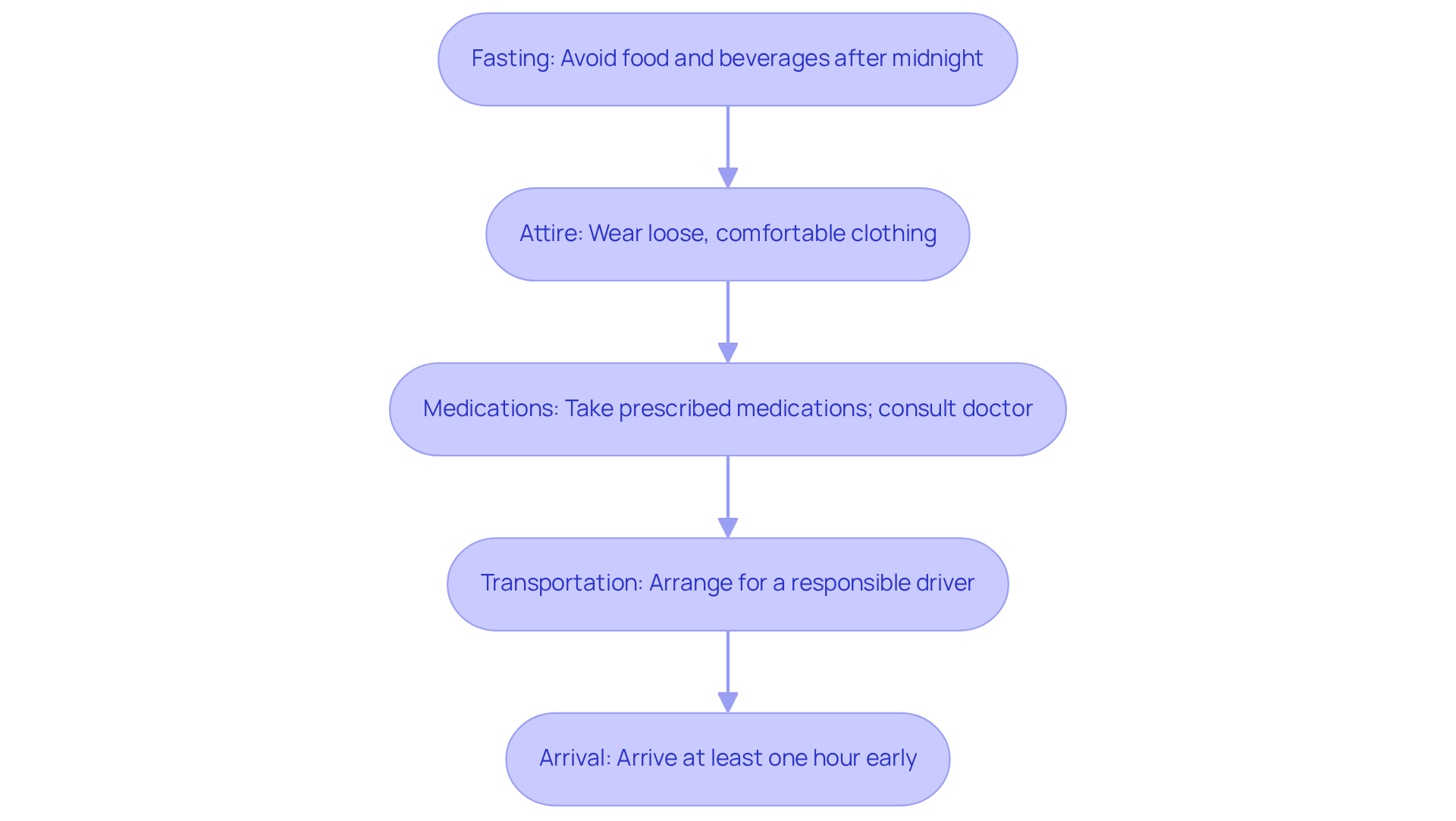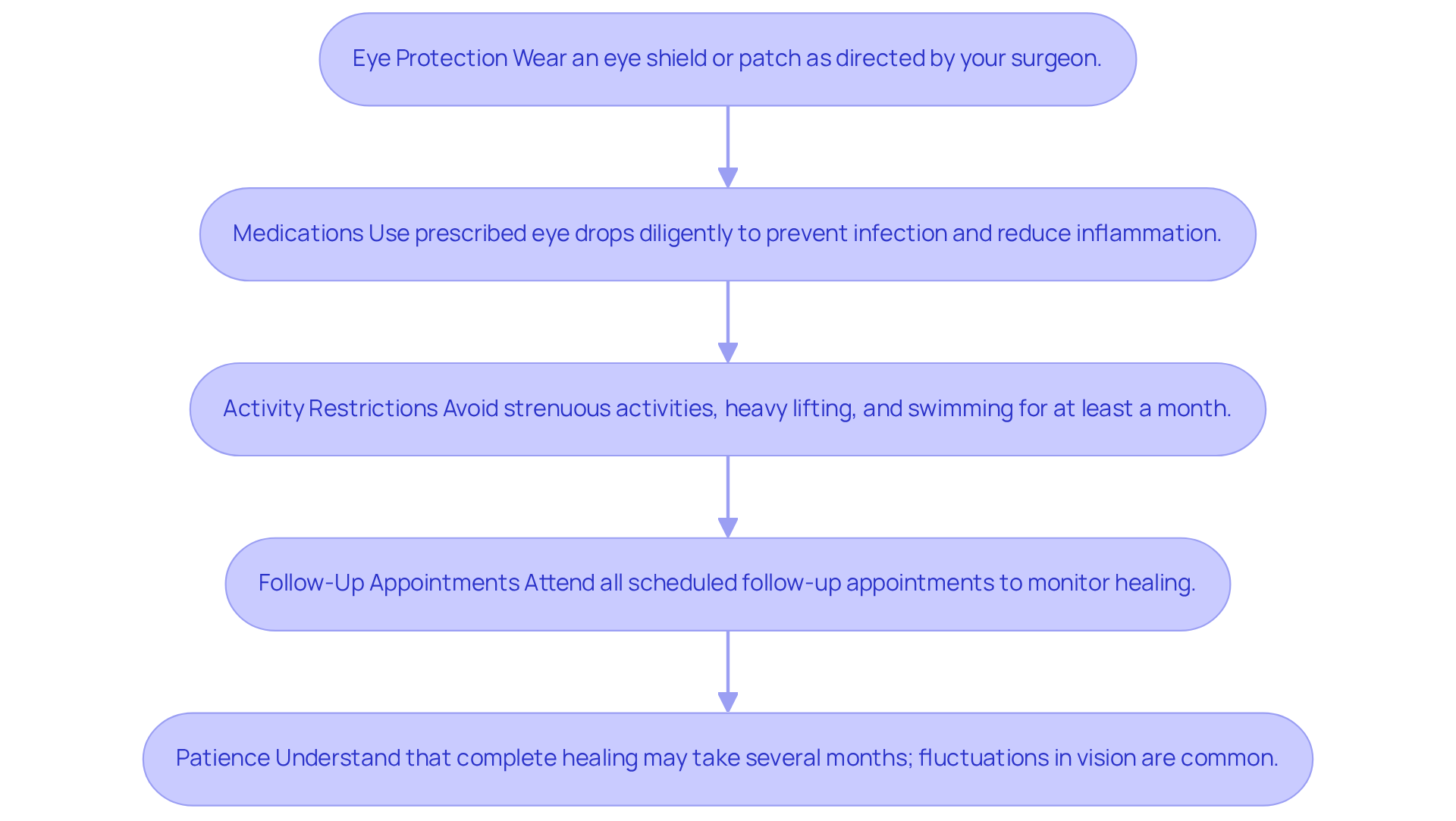Posted by: Northwest Eye in General on July 12, 2025
Overview
This article outlines four essential steps to prepare for your corneal transplant journey. We understand that this can be a daunting experience, and we are here to help you every step of the way. The steps include:
- Understanding the procedure
- Preparing for the pre-admission appointment
- Following day-of-surgery instructions
- Managing post-operative care
Each step is accompanied by detailed guidance on what to expect and necessary preparations. It’s common to feel anxious, but adhering to medical advice is crucial for ensuring a successful surgical outcome and a smooth recovery. Remember, you are not alone in this journey; we are here to support you throughout the process.
Introduction
Navigating the journey of a corneal transplant can be both exciting and daunting. It holds the promise of restored vision and an improved quality of life. We understand that this experience can stir a mix of emotions, and knowing the intricacies of the procedure—from pre-operative preparations to post-operative care—is essential for a successful outcome. However, it’s common to grapple with uncertainties and questions about what to expect at each stage.
How can you effectively prepare for this life-changing surgery while ensuring a smooth recovery? This guide outlines four critical steps that will empower you to approach your corneal transplant journey with confidence and clarity.
Understand Your Corneal Transplant Procedure
A corneal transplant, also known as keratoplasty, is a surgical procedure that substitutes a damaged or diseased eye surface with healthy donor tissue. Typically lasting between 1 to 2 hours, the surgery can be performed under local or general anesthesia, depending on your needs and your surgeon’s recommendation. We understand that comprehending the various kinds of can feel overwhelming.
- Full-thickness grafts, known as corneal transplants or penetrating keratoplasty (PK), involve replacing the entire cornea.
- Partial-thickness procedures, such as Descemet Stripping Automated Endothelial Keratoplasty (DSAEK) and Descemet Membrane Endothelial Keratoplasty (DMEK), focus on the inner layers of the cornea.
Your surgeon will discuss the specific method most appropriate for your condition, taking into account factors such as the degree of eye damage and your overall health.
The potential advantages of an eye tissue replacement include enhanced eyesight and improved quality of life. However, it is crucial to recognize the related risks, such as graft rejection and complications during healing. The typical healing duration for eye surgery patients varies, with many individuals noticing significant visual improvement within several months. Nonetheless, complete recovery can take as long as a year, depending on the type of procedure and personal healing methods.
For example, studies show that DMEK patients achieve a best spectacle-corrected visual acuity (BSCVA) of ≥ 6/12 Snellen at 10 years in 99% of cases, while PK boasts a survival rate of 92%.
Ophthalmologists emphasize the importance of understanding these procedures. One expert noted, ‘the immunological advantages of DMEK lead to lower rejection rates compared to traditional PK.’ This highlights the evolving landscape of corneal transplant techniques, where methods such as DMEK and DSAEK are gaining popularity due to their quicker recovery periods and reduced complication rates.
As you prepare for your procedure journey, we encourage you to familiarize yourself with these key points and engage in discussions with your healthcare provider. It’s essential to ensure a thorough understanding of your upcoming process. Remember, we are here to help you through this journey.

Prepare for Your Pre-Admission Appointment
Before , we understand that you may have many questions and concerns about the procedure. You will have a pre-admission appointment where your ophthalmologist will conduct a thorough eye examination and review your medical history. At Northwest Eye, we are dedicated to providing , welcoming all surgical patients, whether for urgent or elective procedures.
Please remember to bring a list of all medications you are currently taking, including any over-the-counter drugs and supplements. It’s common to feel anxious about the corneal transplant process, and you may also need to undergo blood tests or other evaluations to ensure your overall health. We encourage you to discuss any concerns or inquiries you have about the corneal transplant during your appointment, and take a moment to confirm the date and time of your procedure.
It’s essential to arrange for someone to accompany you for both the appointment and the corneal transplant, as having support can make a significant difference throughout your journey. If you need assistance in scheduling your operation, please don’t hesitate to call us at 763-416-7600. Additionally, we offer a variety of financing programs and payment plans designed to make the cost of care manageable and accessible for you.

Follow Day-of-Surgery Instructions
On the day of your corneal transplant, we recognize the importance of feeling prepared and supported. Please adhere to the following instructions to ensure a smooth procedure:
- Fasting: We kindly ask that you avoid consuming food or beverages after midnight before your operation. This is essential to minimize the risk of complications during anesthesia and to enhance surgical outcomes. Studies indicate that the mean preoperative fasting time is approximately 14.26 hours for solids and 13.89 hours for clear fluids, underscoring the importance of following these guidelines.
- Attire: Choose loose, comfortable clothing when visiting the medical facility. It’s best to avoid makeup, lotions, or perfumes, as these can interfere with the surgical process.
- Medications: Please take any prescribed medications as directed. However, it’s important to consult your doctor regarding any medications you should avoid on the day of the procedure to ensure your safety and the effectiveness of the surgery.
- Transportation: We recommend arranging for a responsible individual to drive you home post-surgery, as you will be unable to drive yourself due to the effects of anesthesia.
- Arrival: Plan to arrive at the medical center at least one hour early. This allows ample time to complete necessary paperwork and prepare for the procedure, ensuring everything is in order for your surgery.
Incorporating expert opinions, such as those from Dr. Thomas Vetter, emphasizes that clear and standardized instructions significantly improve patient compliance, which is vital for a successful surgical outcome. Additionally, it’s important to note that 64% of patients reported discomfort during the preoperative period, highlighting the necessity of proper fasting adherence. We are here to help you through this process and .

Manage Your Post-Operative Care
After your corneal transplant, we recognize that adhering to post-operative care instructions is essential for a successful recovery. Here are some important guidelines to support you:
- Eye Protection: It’s essential to wear an eye shield or patch as directed by your surgeon. This protection helps safeguard your eye during the initial healing phase, preventing accidental injury and supporting optimal healing.
- Medications: Please use the prescribed eye drops diligently. They are vital in preventing infection and reducing inflammation. Following the medication schedule provided by your doctor is important for minimizing complications and promoting healing.
- Activity Restrictions: To ensure proper healing, we advise you to avoid strenuous activities, heavy lifting, and swimming for at least a month. These restrictions help prevent stress on your eye and reduce the risk of complications.
- Follow-Up Appointments: Attending all scheduled follow-up appointments is essential to monitor your healing process. These visits allow your doctor to evaluate your progress and address any concerns. It’s worth noting that studies show at 6 months are approximately 68.5%, and at 12 months, they drop to 57.6%. If you experience any unusual symptoms, such as increased pain, redness, or vision changes, please report them to your doctor immediately.
- Patience: We want you to understand that complete healing may take several months, and fluctuations in vision are common during this period. Being patient and following your doctor’s advice will significantly improve your healing results.
By following these guidelines, you can support your healing journey and improve your chances of a successful corneal transplant. As emphasized by experts, prioritizing follow-up care is essential for optimal recovery. Remember, we are here to help you through this process.

Conclusion
Preparing for a corneal transplant is a significant journey that requires understanding, planning, and active engagement. We understand that this can feel overwhelming, but this guide outlines essential steps to ensure a smooth transition through this important medical procedure. From comprehending the various types of corneal transplants to following precise day-of-surgery instructions and managing your post-operative care, each aspect plays a crucial role in achieving optimal outcomes.
Key insights shared include the importance of thorough preparation:
- Attending pre-admission appointments with a list of medications
- Adhering to fasting guidelines on the day of surgery
- Diligently following post-operative care instructions
Engaging with your healthcare providers and asking pertinent questions can demystify the process and alleviate anxiety, paving the way for a successful recovery.
Ultimately, being proactive in your preparation and care can greatly enhance your experience and results. Embrace this journey with confidence. Remember, support is available every step of the way. By taking these steps, you not only empower yourself but also set the foundation for a brighter, clearer future post-transplant.
Frequently Asked Questions
What is a corneal transplant?
A corneal transplant, also known as keratoplasty, is a surgical procedure that replaces a damaged or diseased eye surface with healthy donor tissue.
How long does a corneal transplant surgery typically take?
The surgery typically lasts between 1 to 2 hours.
What types of anesthesia can be used during the procedure?
The surgery can be performed under local or general anesthesia, depending on individual needs and the surgeon’s recommendation.
What are the different types of corneal transplant procedures?
The main types include full-thickness grafts (penetrating keratoplasty or PK) which replace the entire cornea, and partial-thickness procedures like Descemet Stripping Automated Endothelial Keratoplasty (DSAEK) and Descemet Membrane Endothelial Keratoplasty (DMEK), which focus on the inner layers of the cornea.
How do surgeons decide which transplant method to use?
Surgeons will discuss the specific method most appropriate for a patient’s condition based on the degree of eye damage and overall health.
What are the potential benefits of a corneal transplant?
The potential benefits include enhanced eyesight and improved quality of life.
What are the risks associated with corneal transplants?
Risks include graft rejection and complications during the healing process.
How long does it typically take to heal after a corneal transplant?
Healing duration varies, with many individuals noticing significant visual improvement within several months, but complete recovery can take up to a year.
What are the success rates for different corneal transplant procedures?
Studies show that DMEK patients achieve a best spectacle-corrected visual acuity (BSCVA) of ≥ 6/12 Snellen at 10 years in 99% of cases, while PK has a survival rate of 92%.
Why are newer techniques like DMEK and DSAEK becoming more popular?
These techniques are gaining popularity due to their quicker recovery periods and reduced complication rates compared to traditional PK.
What should patients do to prepare for their corneal transplant?
Patients are encouraged to familiarize themselves with the procedure and engage in discussions with their healthcare provider to ensure a thorough understanding of the upcoming process.






